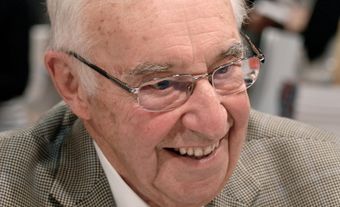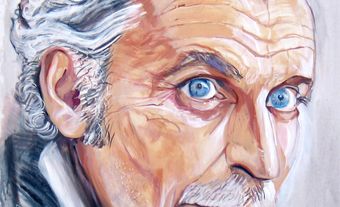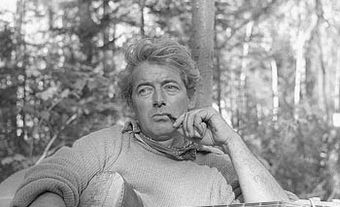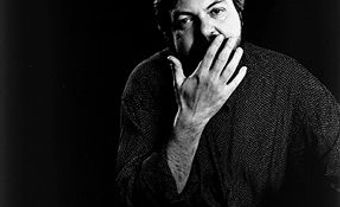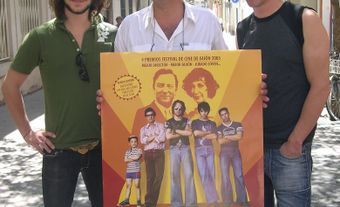Marcel Sabourin, OC, actor, writer, screenwriter, lyricist, producer, director, teacher (born 25 March 1935 in Montreal, QC). An important figure in Quebec cinema and television, Marcel Sabourin has performed in more Quebec films than any other actor. He first came to prominence as Professor Mandibule in the Radio-Canada children’s TV programs Les Croquignoles (1963–67) and La Ribouldingue (1967–71). He is perhaps best known for his role as Abel Gagné in Jean-Pierre Lefebvre’s acclaimed Abel trilogy. Sabourin received the Jutra-Hommage lifetime achievement award at the Jutra Awards (now Prix Iris) in 1999. He was made an Officer of the Order of Canada in 2019.

Early Life and Education
Sabourin was born in Montreal in 1935 and grew up in poverty. He was interested in the arts at a very young age, but his family had no money to send him to school. He began his studies at the age of 12 thanks to a cousin who paid his school fees to make up for a debt owed to Sabourin’s father. Sabourin has said that had this not happened, he likely would have started working at age 12 to help support his family.
His early interest in theatre led him to begin his acting career with the touring children’s theatre La Roulotte, organized by Paul Buissonneau. It performed in Montreal city parks. Sabourin also studied at Montreal’s Collège Sainte-Marie and at the Théâtre du Nouveau Monde (TNM) in his youth.
Early Career
Generations of Quebec children know Marcel Sabourin from two ground-breaking children’s TV programs developed by Radio-Canada: Les Croquignoles (1963–67) and La Ribouldingue (1967–71). Sabourin played the same role in both series, that of the madcap Professor Mandibule.
Already an established television actor in Quebec at age 19, Sabourin decided to complete his formal theatre training over a five-year period in Paris. He studied under Jacques Lecoq, among other veteran French actors. He also studied at The Actors Studio in New York City. At the age of 23, he began teaching at the National Theatre School in Montreal.
Career Highlights
After he returned to Quebec from France, Sabourin worked primarily in theatre. He began his film career in 1967 with his first turn as Abel Gagné in Il ne faut pas mourir pour ça, which he co-wrote with director Jean-Pierre Lefebvre. It would prove to be the first film in Lefebvre’s acclaimed Abel trilogy, which also included Le Vieux pays où Rimbaud est mort (1977) and Aujourd’hui ou jamais (1998).
One of Quebec’s most prolific actors, Sabourin has more than 150 credits to his name in film and television, in both French and English. He has also hosted numerous television shows in Quebec throughout his career, provided his voice to various documentaries (including the French version of the acclaimed Ken Burns series, Baseball), and recorded two audio books. Sabourin has performed in many films about important historical figures, including former Quebec premier Maurice Duplessis, former US first lady Jackie Kennedy, former prime minister Pierre Elliott Trudeau, Métis leader Louis Riel, disgraced property developer Robert Campeau, and the Dionne Quintuplets.
Lyricist
One of Sabourin’s most important contributions outside of acting is as a lyricist. He has been fascinated with Quebec French and its unique expressions and idioms. (See also Joual.) He passed his fascination onto some of his students at the National Theatre School, including Louise Forestier and Robert Charlebois. Sabourin wrote songs for Charlebois. Through his relationship with Charlebois and Forestier, Sabourin played an important role in developing the groundbreaking musical and comedy review L’Osstidcho. It was presented at Montreal’s Théâtre de Quat’Sous and the Comédie-Canadienne in 1968, and then at Place des Arts in 1969.
Family
Marcel Sabourin married his wife, Françoise, in the 1960s. They have four children, including actor and screenwriter Gabriel Sabourin and Jérôme Sabourin, a director of photography.
Honours and Awards
Marcel Sabourin has won many awards and distinctions throughout his long career. He won a Canadian Film Award for his performance in André Melançon’s Des armes et les hommes in 1973. He was also twice nominated for best actor at both the Canadian Film Awards and the Genie Awards (now the Canadian Screen Awards); first in 1977 for Jean Beaudin’s J.A. Martin, photographe and again in 1983 for Fernand Dansereau’s Doux aveux. Sabourin was nominated for best adapted screenplay at the 1980 Genies along with co-writer Jean Beaudin for the film Cordélia. He also shared in winning the first Chalmers Award for Theatre for Young Audiences in 1982 for Pleurer pour Rire.
In Quebec, Sabourin won the first Prix Gémeaux for lead actor in a dramatic series in 1987 for Marie et François. He was twice nominated for the best actor Jutra Award (now Prix Iris) and received the Jutra-Hommage lifetime achievement award in 1999. He was made an Officer of the Order of Canada in 2019.

 Share on Facebook
Share on Facebook Share on X
Share on X Share by Email
Share by Email Share on Google Classroom
Share on Google Classroom
